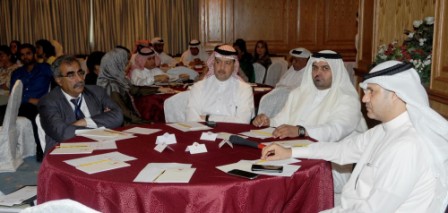Foreign Affairs Ministry holds national consultation meet
Manama
---
The Ministry of Foreign Affairs held a national consultation meeting yesterday in preparation of the third cycle of the UN’s Universal Periodic Review (UPR), during which the Kingdom of Bahrain is expected to submit a national report outlining its human rights framework, policies and initiatives before the end of next year.
The meeting was attended by members of the inter-governmental High Coordinating Committee for human rights (HCC), representatives of the human rights committees of Council of Representatives and Shura Council, representatives of the judiciary, as well as representatives of several other institutions, and civil society organizations. Attending entities presented their input on the status of implementation of recommendations that Bahrain received in the last cycle of the UPR.
The UPR mechanism was established by United Nations General Assembly resolution 60/251 with the aim of improving human rights situation in all UN member nations. This mechanism requires members to submit a report to the Human Rights Council once every four years.
The report is considered an opportunity for countries to showcase all measures undertaken to improve the human rights and highlight challenges countries face in that context. In the UPR process, countries undergoing the UPR process receive recommendations from any of the UN member states, which they could either accept or reject in line with their national interests.
The Kingdom of Bahrain was one of the first countries to ever undergo the UPR process after it was chosen by draw in 2007. The Ministry of Foreign Affairs, with assistance from United Nations Development Programme, prepared Bahrain’s report that was submitted in February 2008.
In the second cycle of the UPR in 2012, Bahrain accepted almost all of the recommendations it received and submitted a voluntary interim report in 2014. It was drafted in cooperation with the National Institute for Human Rights and civil society organizations.
Related Posts

